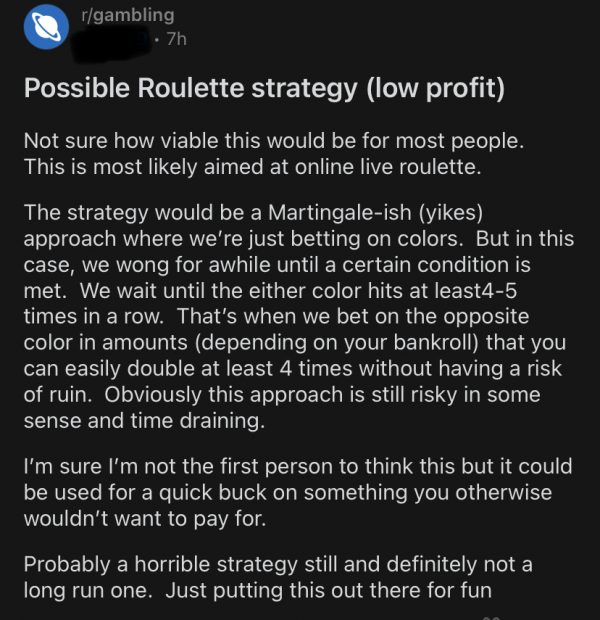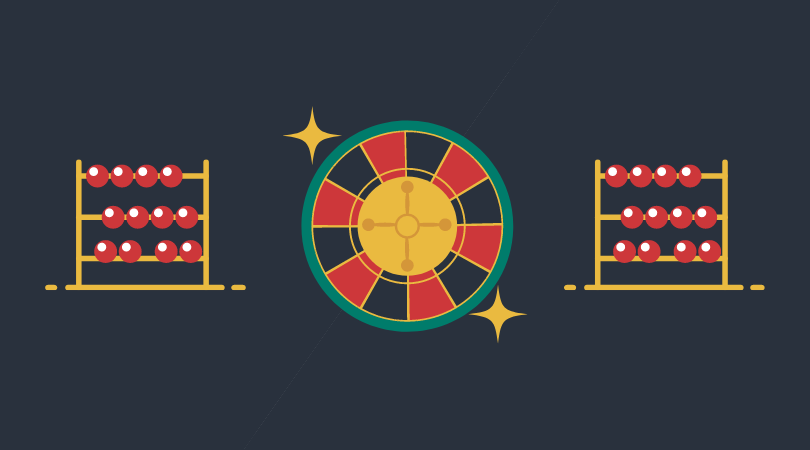The genesis of this episode came while I was perusing the /gambling channel on Reddit, which, like most communities online, offer a mix of good, terrible and completely head-scratching posts, replies and rants. This particular post really grabbed me:

Here’s the post in text form for those who need it. Typographical “nuances” theirs:
“Possible Roulette Strategy (low profit)
This strategy would be a martingale-ish (yikes) approach where we’re just betting on colors. But in this case, we wong for a while until a certain condition is met. We wait until either color hits at least 4-5 times in a row. That’s when we bet on the opposite color in amounts (depending on your bankroll) that you can easily double at least 4 times without having a risk of ruin. Obviously, this approach is still risky in some sense and time draining.
I’m sure I’m not the first person to think this but it could be used for a quick buck on something you otherwise wouldn’t want to pay for.
Probably a horrible strategy still and definitely not a long run one. Just putting this out there for fun.”
The Martingale strategy, in a basic sense, is doubling your bet after a loss to recoup past losses. If you lose your $5 red wager on the first spin, you’d double up to $10 on the next. It’s a fools errand and a lesson in terrible money management. The Martingale is a simple way to doom your bankroll.
Beyond the their misunderstanding of roulette game mechanics, this person’s approach to gambling is what needs to be corrected first. They think they’re on the offensive–that they’ve found a sneaky way to “attack” the casino.
The problem for almost all casual gamblers is that when they think they’re attacking the casino, what they’re attempting to do is trying to attack math. The pesky thing about math, in this instance, is that it can’t be overcome, at least not by the way of a simple betting strategy.
The reason I said “almost all” is because some will say they have an advantage. I know advantage players exist, but this poster and the my general audience are not advantage players. And, really, many people who think they’re advantage players aren’t really advantage players either, but that’s another conversation entirely.
If you disagree with me saying casual gamblers don’t have an edge, then we’re not discussing this in good faith. True AP plays nowadays aren’t simple and obvious – they’re angles not seen by those on a casual trip to the casino. Casual gamblers are, by almost definition, not APs. Another way to distinguish APs and AP wannabes is by their usually miserable temperament. I find many casual gamblers to be very pleasant.
To be clear, if you’re not sure if you’re an AP or not, you’re most definitely not.
The poorly disguised defense
So back the crux of my problem with the post. Not only is the author trying to attack the overwhelming math against them, but at the same time, they have to overcome their lack of understanding of it. Their ignorance of how the game actually works from a theoretical perspective.
This is a problem for all gamblers. For some games, the rules are complex enough. But we also tend to create imperfect mental models as we interact with these games. These cognitive biases can keep us from having tempered expectations about outcomes from session to session.
Take the poster’s idea of “waiting for 4-5 spins” then making a bet on the opposite color. It’s a flaw in their understanding of the statistics of the game. The roulette wheel has no memory. That’s not a problem. The problem is that we do. Every spin is independent of the previous spin.
Betting on a single number on a 00 wheel has a 2.63% chance to win. Every spin. Even if the number you chose came up 99 times in a row, it still has a 2.63% chance of coming up on roll 100.
If you’re wrong in theory, your execution won’t save you.
I use this example to show that when you develop a game “strategy”, when casual gamblers say they have a “money making” strategy in the casino, what they’re really saying is they have a “loss mitigation” strategy. A strategy is really us playing defense we’ve fooled ourselves into thinking was an attack.
Some people play volatile styles and break through and win a decent amount of money. Some are even so lucky to win frequently. It’s rare but it happens. Though, to be clear, volatile, high risk bets cause us to lose more in the long run, despite big winning sessions we might observe
They’re not strategies, they’re playing styles
Not only is there nothing wrong with having a playing style, you should have one. Buying in without an understanding of the rules and without a plan is a terrible approach.
The iron cross playing style is another good example. It’s not some secret the casinos don’t want you to know. It’s not proven to win more money.
The iron cross is a 4 separate bets to cover most numbers on the craps table. Iron cross betters make a field bet (2,3,4,9,10,11,12) and place bets on the 5, 6, and 8. Now, all numbers are covered except the 7. The only way to lose is if the 7 comes up. Nevermind that the 7 is the most common number to be rolled. The most important flaw in thinking this is a “money making” strategy is that while these are 4 separate bets, the casino has the advantage on every individual bet. No combination of bets on the craps table will give you the advantage. It feels like a good bet because we have more win conditions than the casino, yet because of the way they pay out each of those bets, they still retain the advantage.
All this being said, you should still play this way if you enjoy it. My craps playing style is completely suboptimal. As is all of my play in the casino. It’s likely yours is too. That’s ok.
Casual gamblers would be better served ignoring the urge to uncover a money making strategy, you won’t. My advice to new and all casual gamblers is to spend far more time thinking about money management, both prior to going to the casino and within the casino.
Think about how you can responsibility build and manage a gambling bankroll. Is there a way and amount that doesn’t interfere with other financial responsibilities you have? What do you do when it’s depleted? How much is ok for a single trip or day? What about your game roll? How much is ok to buy-in with on a single game in a session?
The answers to all these questions will vary from person to person. As it should. Never feel inadequate for having a gambling bankroll less robust than a peer. All discretionary spending comes with an opportunity cost. The more you spend gambling the less you have for other goals or responsibilities.
How much you need on a trip will be dictated by game mechanics (relative volatility) and your preferred playing style. Limited game roll? Perhaps shy away from volatile games like an uncrowded blackjack table.
Having a solid grasp on how you can effectively manage your bankroll will have a far greater impact on your casino experience than developing some unique money making strategy. A good, casual gambler doesn’t search for an edge that isn’t there. Instead, we accept the price of admission. That price covers entertainment, camaraderie and, of course, the chance to leave with a few more bucks than we came with.
The goal is to enjoy ourselves. Our lives are littered with stress. Why search for it elsewhere? Manage your expectations, manage your bankroll, and just go have fun.
Coming up with bankroll building rules and strategies is a challenge and something I will continue to explore and foster conversation about. Do you have any tips for keeping your expectations in check and your bankroll safe?
If you think you need to talk to someone about problem gambling, contact the National Council on Problem Gambling by calling 1-800-522-4700 or through their online chat (ncpgambling.org/chat). There’s absolutely no shame in reaching out and getting the help you need and it’s completely confidential.











Add comment